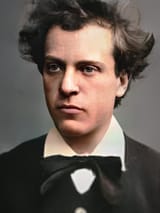Search Results
7/14/2025, 2:48:10 AM
>>127032868
I would say the biggest crash out was Rott.
>Rott had begun his musical studies with the tentative support of his father in 1874. His organ teacher was the great Austrian symphonist Anton Bruckner, whose work, while rooted in the formal traditions of Beethoven and Schubert, was inflected with Wagnerian harmony and orchestration. Bruckner thought very highly of his student and later proclaimed to a group of fellow teachers who had been deriding a Rott composition: “You will hear great things yet of this man!” It wasn’t Rott the world would hear of, however, but two of his fellow students: Hugo Wolf and Gustav Mahler.
>For the final year of his studies in 1878, Rott submitted the first movement of his Symphony in E major to a composition contest. The jury, except for Bruckner, was very derisive about the work. After completing the Symphony in 1880, Rott showed the work to both Brahms and Hans Richter, in order to get it played. His efforts failed. Brahms did not like the fact that Bruckner exerted great influence on the Conservatory students, and even told Rott that he had no talent whatsoever and that he should give up music.
>Rott began to evidence persecutory delusions. In October 1880, while on a train journey, he reportedly threatened another passenger with a revolver, claiming that Brahms had filled the train with dynamite. Rott was committed to a mental hospital in 1881, where despite a brief recovery he sank into depression. By the end of 1883 a diagnosis recorded "hallucinatory insanity, persecution mania—recovery no longer to be expected." He died of tuberculosis in 1884, aged 25.
I would say the biggest crash out was Rott.
>Rott had begun his musical studies with the tentative support of his father in 1874. His organ teacher was the great Austrian symphonist Anton Bruckner, whose work, while rooted in the formal traditions of Beethoven and Schubert, was inflected with Wagnerian harmony and orchestration. Bruckner thought very highly of his student and later proclaimed to a group of fellow teachers who had been deriding a Rott composition: “You will hear great things yet of this man!” It wasn’t Rott the world would hear of, however, but two of his fellow students: Hugo Wolf and Gustav Mahler.
>For the final year of his studies in 1878, Rott submitted the first movement of his Symphony in E major to a composition contest. The jury, except for Bruckner, was very derisive about the work. After completing the Symphony in 1880, Rott showed the work to both Brahms and Hans Richter, in order to get it played. His efforts failed. Brahms did not like the fact that Bruckner exerted great influence on the Conservatory students, and even told Rott that he had no talent whatsoever and that he should give up music.
>Rott began to evidence persecutory delusions. In October 1880, while on a train journey, he reportedly threatened another passenger with a revolver, claiming that Brahms had filled the train with dynamite. Rott was committed to a mental hospital in 1881, where despite a brief recovery he sank into depression. By the end of 1883 a diagnosis recorded "hallucinatory insanity, persecution mania—recovery no longer to be expected." He died of tuberculosis in 1884, aged 25.
Page 1
